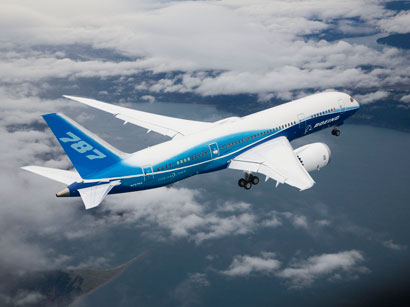Baku, Azerbaijan, Aug. 14
By Umid Niayesh - Trend:
Iran has not imported any plane parts so far from the U.S. aircraft manufacturer Boeing despite the signed Memorandum of Understanding (MoU), Iranian MP, Jalil Sar Ghale says.
Sar Ghale, who is member of the Iranian parliament Construction Commission, said that Boeing's offered price for spare parts are three times more than current market prices, Iran's IRIB news agency reported on Aug. 14.
He went on to add that the U.S. company is abusing the sanction circumstances to sell parts to Iran at higher prices, adding the Iran's Civil Aviation Organization has rejected the deal.
The MP said that Iranian aviation authorities currently provide needed parts for prices 3 times cheaper than Boeing's offer, bypassing the sanctions.
If Boeing does not reconsider its prices, Iran will not buy spare parts from the company, he underlined.
The deputy director of the Airline of the Islamic Republic of Iran (Iran Air) Mohammad Reza Khoshnevisan said earlier that Iran pays four to five times more for importing aircraft spare parts.
Following the Geneva interim deal to ease a decade-long standoff over Iran's nuclear activities, which came in to force on Jan. 20, Tehran was allowed limited purchases of aircraft parts and repairs.
On July 24, AFP reported that Boeing has struck a deal with Iran Air to provide plane parts, the first time the U.S. firm will be doing business with Iran since the U.S. embargo of 1979.
According to a regulatory filing published on July 23, Boeing will supply goods and services "related to the safety of flight" to Iran Air, the country's flag carrier.
Iran Air public relations manager Shahrokh Nooshabadi said Boeing has just provided Iran Air with flight security documents and manuals.
An ageing fleet as well as import of aircraft and its spare parts are the main challenge of the Iranian airlines.
Iran's four largest carriers - Iran Air, Aseman Airlines, Mahan Air and Iran Air Tours - all have average fleet age above 22 years, according to the Iranian media outlets.
Out of Iran's 250 commercial planes, about 150 were flying while the rest are "not functional" due to a lack of spare parts, Ali Reza Jahangirian, head of Iran's Civil Aviation Organisation said on May 1.
The situation for flag carrier Iran Air is worse. Its 37 active aircraft have an average age of 24 years. Two of its active Boeing 747s have been flying for close to four decades.
The fleet includes some planes for which there are ample parts, such as the Fokker 100 and MD-80. Many have been recently mothballed, making their spares relatively cheap.
Others, like the earliest vintage Boeing 747s and the first Airbus A300 aircraft, depend on a shrinking supply of parts or a steady flow of organ transplants from other "donor" aircraft.
"Ultimately the most cost-effective solution for Iran, when sanctions allow, would probably be to upgrade their fleet. There comes a stage when it becomes impossible to support aircraft because of their age," Air Salvage's Gregory said.






